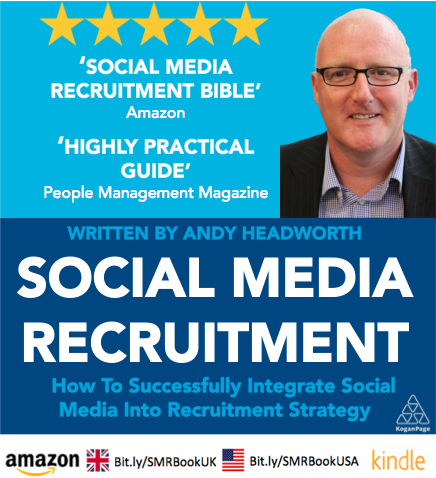How Far Behind The Modern Recruiting Curve Are You?
There was me thinking that the UK was ahead of the recruiting curve in terms of innovation and technology, but it would appear not. So what makes me draw this conclusion?
Aside from the many conversations I have with prospective companies with regards to their recruitment strategies, process and technologies, it was a blog post, a conference workshop I ran in Budapest and a recent survey that really emphasised the fact that we are not as advanced at recruiting as we think we are. So what that means to me, is that even though there is still a high demand for skills and talent to satisfy business demand, recruiting and HR departments are not taking advantage of different ways of improving their recruiting efficiency.
Let me explain what I mean.
I was reading a post that featured Jamie Leonard, founder of specialist recruitment event company Reconverse, earlier this week, where he was asked his opinion on the current state of recruitment. Jamie has been in the industry for a good few years, and speaks to many recruitment / HR / Talent leaders every week at his events, so he is a great barometer of the day-to-day challenges in recruitment. There are several observations he makes that demonstrate what I am referring to:
- In-house recruiters FEAR being left with legacy technology that doesn’t meet the requirements of modern day recruitment.
- Recruiters struggle to source any candidates that can’t be found on LinkedIn. The market has become too reliant on one platform and talent leaders are starting to understand why they need to be able to find people elsewhere.
- Recruiting recruiters that are able to move to becoming proactive talent finders instead of job board responders, is proving a real challenge.
- Social media is the biggest concern for recruiters.
- Companies are just not moving quick enough to embrace tools to understand and engage candidates more effectively - specifically CRM’s (as opposed to an ATS), mobile and using data to make better decisions .
The things that surprises me is that none of these observations above is a new problem / challenge. The industry has been experiencing ALL of them for a number of years - yet STILL companies are slow at making change. Why?
Last week I was in Budapest, Hungary speaking at an online recruitment conference. In the follow-up workshop in the afternoon, I asked the audience if they had a problem recruiting talent currently - and of course they (nearly) all said yes. They all used LinkedIn for recruiting, but when I asked about Facebook, only three people in a full room put their hands up. And yet when I showed them the potential of Facebook for recruiting (as well as many other platforms), there was a a definite change of opinion. This was a great example of playing safe and doing what you have always done - even though the method they were using (Linkedin in this case) was proving less effective. It never hurts to try something new.
Take social media. It has been around now for nearly ten years, and is mainstream with people of all ages. We all use multiple social networks every day to chat, talk, share pictures, keep in contact with friends, check news and events and many more other ways. Yet for some reason recruitment / HR STILL don’t get how useful it can be for recruiting talent - and because of this they haven’t taken the time to integrate social media into their recruitment process. This was proved in a recent 2015 Jobvite Recruitment Survey in the UK, where only 40% of the recruiters surveyed use social media in the recruitment process. This is even more crazy when 86% of the same recruiters surveyed anticipate the job market to remain the same or get more competitive - i.e. talent shortages and difficulty finding talent for their roles. Compare this to a comparative statistic for the Jobvite US Recruitment survey where 92% of recruiters in the U.S. use social media.
If you are in the 60% of recruiters not using social media then maybe you should invest in a copy of my recent book? It is a proven practical guide to help you with loads of tips and case studies.
Then consider the addition of mobile. Do we really have to be saying to companies that have to have mobile career sites? Google told us last week that over 50% of all searches are now done on a mobile device, and yet companies are still pushing back on going mobile. I wrote last week that the trend for candidates is towards mobile messaging as opposed to desktop emails, yet still recruiters keep doing what they have always done - send InMails and emails! Just this week while doing a recruitment audit for a client, we found that 50% of their web traffic was via mobile. Check your analytics - I would like to bet it is very similar at your company. While you are there, check your bounce rate for your career pages that are not mobile friendly - and then consider how many potentially talented candidates you are losing by them leaving your site immediately, because the content isn’t mobile friendly!
Technology change is a little different, but it doesn’t have to be. I understand that going through a selection and purchasing process for a new ATS or a CRM, might be a little time consuming for some companies. But should that stop you trying something different in the meantime? There are many SaaS tools within the recruiting industry that be be ‘plugged-in’ to your existing processes to immediately improve online process, candidate experience, mobile and social recruiting etc. It is just a question of being prepared to try something different, and not wait for others to try them first.
So in response to Jamie’s points above here are five ways that your company can start to affect change today:
- Take the time to understand what the talent you are trying to recruit REALLY looks like and where they are. This will quickly show you where you need to be focusing your recruiting efforts and the direction your technology needs to take with regards to ATS, CRM, searching tools etc.
- Please realise that while LinkedIn is a fantastic platform, not all your candidates are necessarily going to be on LinkedIn. They could be in your database (remember all those previous applicants you have had over the last few years?), on different social platforms even offline at different events and conferences. Take the time to find them - others simple won’t bother, meaning you will gain a competitive advantage.
- Learn to be proactive recruiters. Take the time to train and develop your teams in the latest and updated methods for finding and engaging talent. Starting with the excellent Black Belt Recruitment Training platform over at Social Talent, would be a great way to do this. And of course don’t forget to buy them a copy of my book 😉
- Social media should not be a concern. There is a huge amount of content in how to get started using social media, and if you wanted to look at getting started then check out this post on creating a social media recruitment strategy framework. Alternatively get in contact with me and let’s talk.
- Speak to your current ATS and CRM providers to ensure you are using the latest modules, add-ons and versions on your software. You will be surprised how many companies don’t realise the level of functionality that could be available to them on the platforms they are currently using. Ask them about social, mobile, SMS and instant messaging functionality - it might be available to you quicker than you think!
Over all I do believe that this is all to do with attitude of mind. Companies need to stop doing things the way they are, just because they have always done them that way, and adopt a new ‘try something different’ approach to recruitment.
If you want to discuss / need help for any of the above further, just let me know. And remember if you like this post, don’t forget to subscribe to Sirona Says blog to ensure you don’t miss the weekly posts.

-
Jamie Leonard










